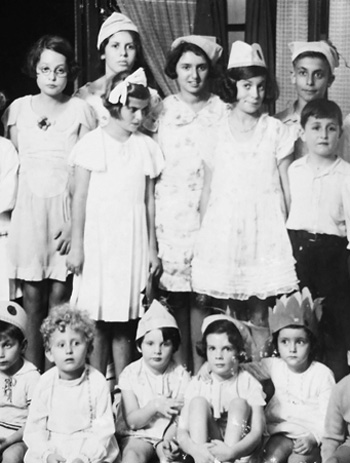This series of articles provides insight into the little-known history of the Jewish community in Indonesia
Rotem Kowner
Hanukka in Bandung, 1935Hanoch Silberberg |
Present-day Indonesia recognises six official religions. Judaism is not one of them. Yet the history of Jewish settlement in Indonesia dates back at least several centuries and extends across Dutch colonialism, Japanese occupation and Indonesian independence. The major testaments to Jewish life in the Indonesian archipelago today are the synagogue in Surabaya, several cemeteries with cracked tombs bearing Jewish names and a large seven-branched Menorah in Manado.
A few Jews still live in the archipelago but they are a pale shadow of the community that prospered in what was then known as the Dutch East Indies until little more than sixty years ago. On the eve of the Pacific War (1941-45) Indonesia’s Jewish community comprised about 3000 members. By 1957 there were around 450. Six years later that number had dwindled to around 50. Since 1969 there have been probably fewer than twenty Indonesian-born Jews in the entire country.
Despite being one of the largest Jewish communities in Southeast Asia in the first half of the twentieth century, very little has been written about its history. Even less is known about its wartime experiences under the Japanese occupation. However, this community can tell us a great deal about broader issues such as early migrations from the Middle East and Indian subcontinent to the Indonesian archipelago; the Portuguese and Dutch attitudes to non-indigenous and non-Christian groups in their Southeast Asian colonies; the Japanese wartime treatment of minorities and Indonesian attitudes towards Jews and Israel after independence.
This cluster of articles draws on research begun in 2003 after an appeal by a small Israeli association called Tempo Dulu. Established in 1995, Tempo Dulu has around fifty members who were born in the Dutch East Indies and who share an affection for the archipelago and its people. In the following years, we interviewed just about everyone who was born in the Dutch East Indies, who endured wartime internment in Japanese camps, and who immigrated to Israel in its aftermath. Many of these Indonesian-born Israelis are still nostalgic for the golden age in a lost paradise. It is easy to understand this community’s yearnings for the tropics, the beautiful landscape, the good-hearted people and the affluence and security they enjoyed. But it is important, too, to understand that it had been increasingly obvious from the early twentieth century that this paradise had no future, and that the imminent Japanese occupation only accelerated its demise.
To commemorate the largely untold story of this community and its vanishing heritage, we convened a two-day conference at the University of Haifa in late December 2010. The majority of the articles included here are an outcome of this conference. Rotem Kowner presents what is possibly the first attempt to recount the pre-war history of the community from the arrival of the first recorded Jew to its peak in the 1930s, while Ronit Ricci explores the image of Jews in Indonesia from early times to the present. Ayala Klemperer-Markman narrates the ordeal of the Jewish community during the Japanese occupation and its experience of the post-war Indonesian struggle for independence – a perspective that Kathryn Pentecost then further illustrates with the tale of her adventurous Jewish grandfather, who died at the hands of the Japanese. Giora Eliraz then explains the political and social context in Indonesia in the 1950s which facilitated the departure of the remaining Jewish community, much of it from Surabaya. Finally Elias, one of the country’s last remaining Jews, reflects on his own experiences of being Jewish in Indonesia.
It was impossible to complete this research without the help of several individuals and organisations. Suzy Lehrer and members of the Tempo Dulu Association in Israel provided the insights into the Jewish internment in Indonesia. Irene Eber, Jonathan Goldstein, Uri Kupferschmidt, Naoki Maruyama, Meron Medzini, Ran Shauli and Ben-Ami Shillony were helpful and supportive as usual, and provided the background and context for this project. The research on the Jewish community in Indonesia was supported by the Stichting Collectieve Maror-gelden Israel and the Vidal Sassoon International Center for the Study of Antisemitism at the Hebrew University of Jerusalem. The research on racial issues related to wartime Japan and the Dutch East Indies was supported by the German-Israeli-Foundation for Scientific Research and Development.
Rotem Kowner (kowner@research.haifa.ac.il) is Professor of Japanese modern history and culture at the Department of Asian Studies, University of Haifa, Israel. Since 2003 he has been researching the history of the Jewish community in Indonesia, with a particular interest in its wartime experience. Some glimpses of his findings were published in the article ‘The Japanese internment of Jews in wartime Indonesia and its causes’ in Indonesia and the Malay World (2010).











